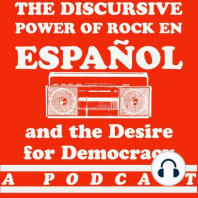2 min listen

Episode Seven—The Rock en Español Legacies in SoCal
FromThe Discursive Power of Rock en español and the Desire for Democracy
Episode Seven—The Rock en Español Legacies in SoCal
FromThe Discursive Power of Rock en español and the Desire for Democracy
ratings:
Length:
39 minutes
Released:
Aug 2, 2023
Format:
Podcast episode
Description
So, what are the legacies of Rock en Español in Southern California?In this episode, we are joined by Vivian Vega, a recent UCR graduate to discuss how “Rock en Español” has long been a part of her life during different eras.Vivian tells us how her tías taught her los pasos prohibidos, or rather las canciones prohibidas de Molotov. Plus, Vivian —who is in her 20s— shares with us how she finds meaning and inspiration in the songs of bands like Panteón Rococó and Caifanes.Vivian will also discuss her experience working on archiving and digitizing the letter collection of LA's Club Rock en Español.Plus, we will discuss Caifanes/Jaguares long commitment to advocating for greater democracy in Mexico and demanding justice for the victims of femicides in Mexico. Speaking of Caifanes, the episode features a true sonic treat: the complete version of “Viento” by the students of Miramonte Music program in South L.A.Song Listing: In this episode we heard a version “Viento” by Caifanes. The version here is performed by the students of Mira Monte Music Program in South Los Angeles. We also listened to Parasito by Molotov, Indocumentado from El Tri, Panteón Rococo’s own La Carencia. Plus a snippet of Mon La Ferte and Bunbury “Mi Buen Amor” and also from Chile Depresión Post-Mortem's own post-punk version of Zion and Lennox’s reggaetón classic “Yo Voy”.Original songs played in our episodes are included in our Podcast Playlist. Make sure to check it out as new songs are included weekly during the summer 23.Episode Seven Bibliography. Books and Articles for further reading and research:—Alcazar, Merarit Viera. "Feminism, youth, and women who rock: Rocking is also a way to fight." Youth, inequality and social change in the Global South (2019): 99-111.—Alexander, Anna Rose. "One Fire, Two Songs: Óscar Chávez and El Tri Sing about San Juanico, 1984." The Latin Americanist 64, no. 4 (2020): 377-392.—De la Peza, María del Carmen. El rock mexicano: un espacio en disputa. Tintable, 2014.—De la Peza, María del Carmen. "El ska en México. Panteón Rococó y la cultura política juvenil." Revista Argentina de Estudios de Juventud 4 (2011).—De la Peza, Carmen. "Panteón Rococó: Mexican Ska and Collective Memory." Intercultural Communication Studies 19, no. 3 (2010): 112-23.—Chew, Selfa A. "Representations of Black Womanhood in Mexico." Studies in Latin American Popular Culture 36, no. 1 (2018): 108-127.—Corona, Ignacio. "The Politics of Language, Class, and Nation in Mexico’s Rock en espafiol." Song and Social Change in Latin America (2013): 91.—Cruz, José Hernández Riwes. "Si no das el trancazo tú. Del paradigma anglofílico al “multicultural” en el rock hecho en México." Revista Tema y Variaciones de Literatura 59 (2022): 45-60.—Green, Andrew James. "Activist musicianship, sound, the ‘Other Campaign’and the limits of public space in Mexico City." In Ethnomusicology Forum, vol. 25, no. 3, pp. 345-366. Routledge, 2016.—Hernández, Deborah Pacini. "Amalgamating musics: Popular music and cultural hybridity in the Americas." In Musical Migrations: Transnationalism and Cultural Hybridity in Latin/o America, Volume I, pp. 13-32. New York: Palgrave Macmillan US, 2003.—Martínez, Laura. "Música y resistencia cultural: Rock mexicano contemporáneo." Revista Iberoamericana 72, no. 217 (2006): 957-971.—Velasco, Xavier. Una banda nombrada Caifanes. Dragón, 1990.
Released:
Aug 2, 2023
Format:
Podcast episode
Titles in the series (10)
The Discursive Power of Rock en español and the Desire for Democracy: Trailer by The Discursive Power of Rock en español and the Desire for Democracy